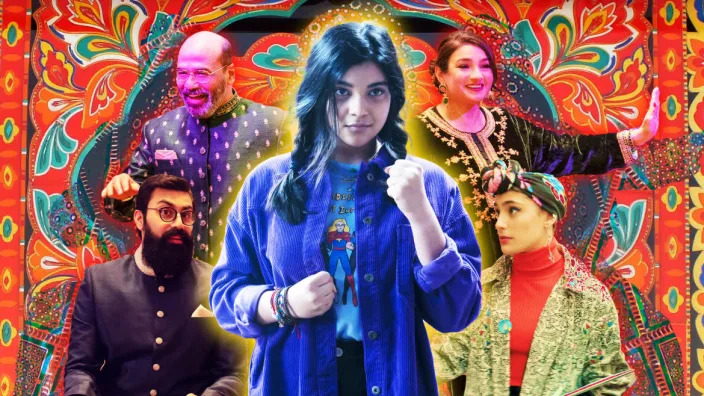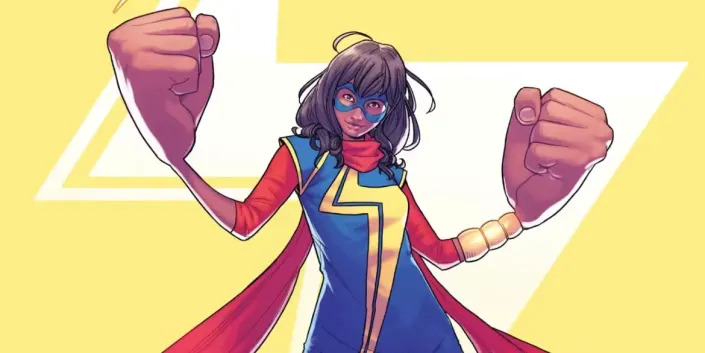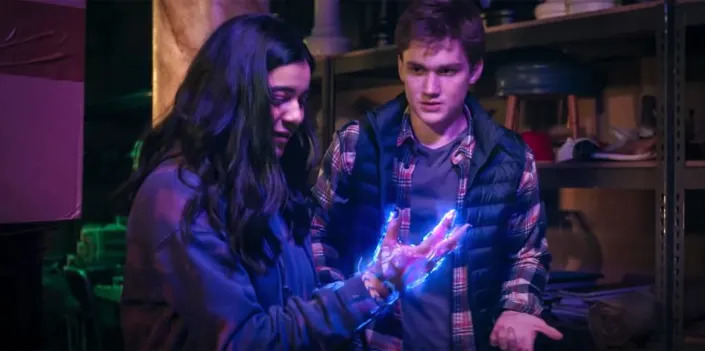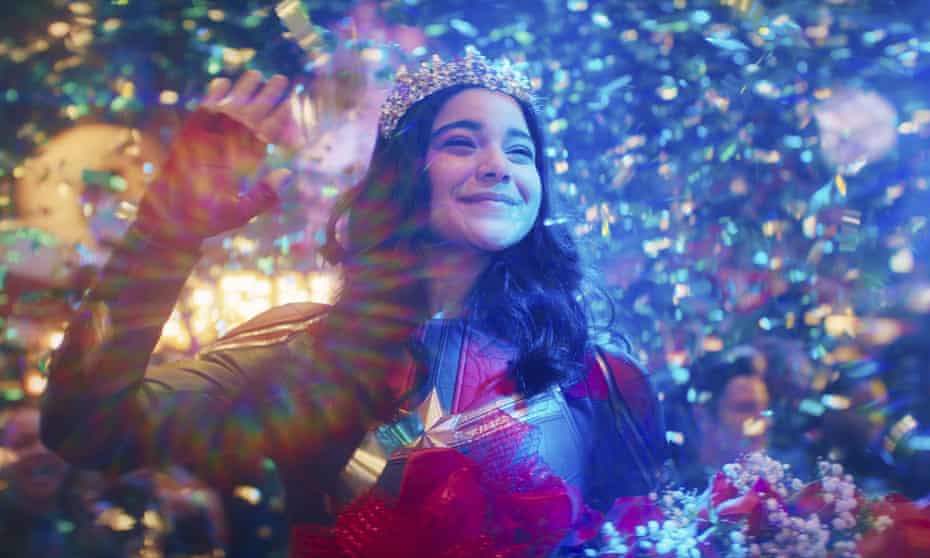Griffin Jaege
Actor Iman Vellani has always been an avid fan of the Avengers and comics — so making the move from Markham, Ont., to the Marvel Cinematic Universe to portray its first Muslim superhero is an achievement she finds almost indescribable.

© Courtesy of Marvel Studios
Vellani, 19, stars as Kamala Khan in the upcoming series Ms. Marvel, launching on June 8 on Disney+.
Vellani's role also marks the franchise's second South Asian hero — and the first female one. In 2021, Kumail Nanjiani played Marvel's first South Asian superhero in Eternals, taking on the part of Kingo, a Bollywood film star turned superhero.
Before this, despite the abundance of South Asian characters present in Marvel comics — think Thunderbird, Timeslip and Omega Sentinel — the films have limited South Asian roles to supporting characters like Dr. Ratha in The Amazing Spider-Man (Irffan Khan) and Dopinder in the Deadpool franchise (Karan Soni), parts critics suggest were largely built around stereotypes.
Criticism about the lack of diversity for lead actors in the superhero franchise had also been growing.
And Vellani said she sees this role as also being about representing her community and showcasing South Asian culture.
"Film and TV literally shape how we see people in this world. And so, you know, when you're only representing Muslims in a certain type of light, it gets very one-note," the Pakistani-born Canadian actor said.
"I'm so glad that Marvel's providing space for a character like Kamala to exist and to just take up space and tell a very specific story about a very specific girl."
The show focuses on Khan, a Muslim-American teen and superhero mega-fan growing up in Jersey City. She deals with the pressures familiar to many teens: struggling to fit in at school and finding support at home.
Then, she finds out she has superpowers of her own.
Brie Larson, known for her role as Captain Marvel, the franchise's first female superhero, reached out to Vellani shortly after she was cast.
"She was just holding my hand throughout all of it," Vellani said. "It was really nice to kind of have that guidance of someone who's gone through all of this and everything that I'm experiencing right now."
The storyline presents a unique parallel to Vellani's daily life. Being a fan herself, she describes stepping into the world of Marvel as "so much fun."
"I was on set and I was just, like, totally gushing over everything I'm seeing around me," said Vellani.
The show's team didn't let her see the set of the first episode's "Avenger Con" convention until the day they shot the scene — they knew her reaction would be just as exuberant as Kamala's.
"They were like, 'Whatever your reaction is going to be in real life is what we want ... so just be yourself,'" she said, describing the energy she brought to the character.
"That specificity is really what makes a character believable and what is going to represent people … not generalizing all of the brown people into one character."
Ms Marvel - How NOT To Build A Hero
DESK REPORT
The actor said Kamala Khan is the first brown superhero we all can relate to.
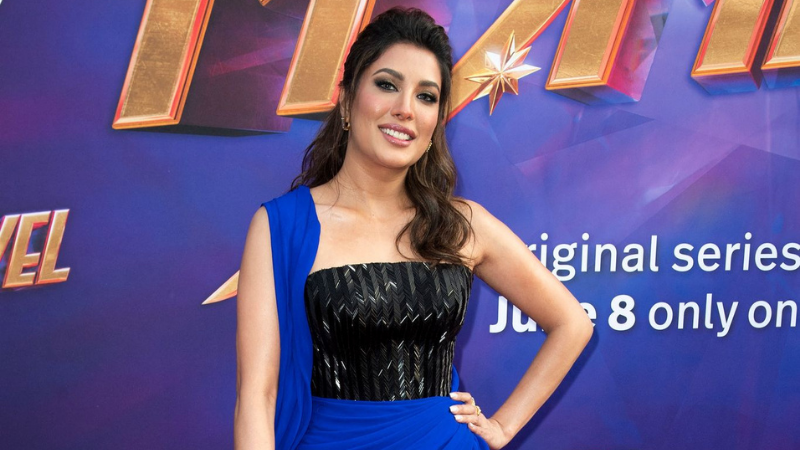
Photo: AFP
Disney+ and Marvel's upcoming show Ms. Marvel has been the talk of the town for desis all over social media, be it our very own Pakistani celebrities representing on the red carpet in Hollywood, or some snippets from the show that left many demanding correct representation. But for Mehwish Hayat, Ms. Marvel is an "accurate representation" of Pakistani culture.
On Sunday, the actor shared photos from the premiere event of the show held in Los Angeles. In her post, she wrote, "Working on Ms Marvel and being part of the MCU is a dream come true for me! You cannot believe what it means to finally have the first brown Muslim superhero that we can all relate to and who speaks for us. Words can't describe how happy my inner child is to see my culture being so accurately represented on screen, in a mainstream Hollywood production."
She also wrote that it means a lot that Marvel made an effort to cast Pakistani actors in key roles. "I hope that this will not only show actors in Pakistan that they need to look beyond their own borders but also give Hollywood the confidence to cast talent from Pakistan."
She also complimented the main lead, Iman Vellani, who plays Kamala Khan. For Hayat, Vellani is a "real firecracker" who is destined to be a big name in Hollywood.
Hayat bumping into Kevin Feige, president of Marvel Studios, and Louis D'Esposito, film producer, was the "icing on the cake" of her trip. She also wrote that Marvel needs to be applauded because they have made every little girl, not just brown, believe that they are special and can achieve their dreams if they believe in them enough. "Look at me… a girl from Karachi walking the Red carpet in Hollywood shows anything is possible."
In the show, Vellani plays 16-year-old Kamala, a Pakistani-American teen who lives in Jersey City. Kamala is an aspiring artist, an avid gamer, and a voracious fan-fiction scribe. She is also a huge fan of the Avengers — and one in particular, Captain Marvel. But Kamala has always struggled to find her place in the world — that is until she gets super powers like the heroes she’s always looked up to.
Earlier last month, Chinoy had announced that Disney and Marvel have created a special theatre format for Ms. Marvel. The six-episode show will be split into three parts according to the filmmaker.
Episodes one and two will debut on June 16, three and four on June 30 and five and six on July 14.


